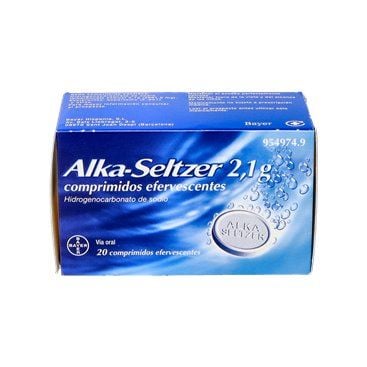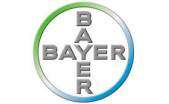Alka Seltzer 20 effervescent tablets
It belongs to the group of medicines called antacids that work by reducing excess acidity in the stomach.
It belongs to the group of medicines called antacids that work by reducing excess acidity in the stomach.
Alka-Seltzer (2.1 G 20 Effervescent Tablets)
Sodium hydrogen carbonate
ACTION AND MECHANISM
[ANTI-ACID] absorbable (sodium). Derived from sodium. It works by neutralizing hydrochloric acid in the stomach, increasing gastric pH, which also reduces the formation and activity of pepsin. Urinary alkalizing and systemic alkalizing.
INDICATIONS
[GASTRIC HYPERACIDITY]: Symptomatic relief of occasional gastric discomfort related to hyperacidity.
POSOLOGY
Oral route:
- Adults and children over 12 years of age: the usual dose is 1 effervescent tablet, if necessary increase to 2, after meals or when feeling gastric discomfort.
Always use the lowest dose that is effective.
Do not exceed 6 tablets in 24 hours.
DOSAGE IN KIDNEY INSUFFICIENCY
- It should be used with caution.
RULES FOR CORRECT ADMINISTRATION
The tablets should be taken 20 minutes to 1 hour after meals, completely dissolved in a glass of water and once the effervescence has stopped, in order to reduce abdominal distension. It is recommended to remove the tablets from the strip immediately before administration. It should not be used for more than 14 days.
This medicine should not be taken on a stomach that is excessively full of food or drink. Before taking, wait until 20 min to 1 h have elapsed after eating.
PRECAUTIONS
- [RENAL INSUFFICIENCY]. In renal failure, sodium accumulation can occur that can lead to hypernatremia and increased fluid retention.
- [HEART FAILURE]. Sodium can produce hypernatremia that results in alterations in the Na + -K + ATPase pump, reducing the effectiveness of cardiac contraction. In addition, water retention can generate hypervolemia that produces an increase in preload and further hinders the functionality of the heart.
- [ARTERIAL HYPERTENSION]. The sodium content of this medicine can increase fluid retention and blood pressure.
- [ALKALOSIS]. Sodium bicarbonate is a systemic antacid that is absorbed from the gastrointestinal tract, so its use over a long period can lead to metabolic alkalosis.
PRECAUTIONS RELATING TO EXCIPIENTS
- This medicine contains sodium salts. To know the exact sodium content, it is recommended to review the composition. Oral and parenteral dosage forms with amounts of sodium greater than 1 mmol (23 mg) / maximum daily dose should be used with caution in patients with [ARTERIAL HYPERTENSION], [KIDNEY FAILURE] or with low sodium diets.
- This medicine contains aspartame as an excipient, so it should be taken into account by people affected by [PHENYLKETONURIA]. 100 mg of aspartame correspond to 56.13 mg of phenylalanine.
ADVICE TO THE PATIENT
- It should not be used for more than 14 days. If symptoms worsen or persist for more than 14 days, see a doctor.
- Do not exceed 6 tablets per day.
- The sodium content of this medicine can increase fluid retention and blood pressure, which should be taken into consideration in patients with hypertension or heart failure.
- Do not take with milk.
SPECIAL WARNINGS
- Patients should be monitored for possible milk-alkali syndrome if used for prolonged treatment.
- Bicarbonate can dissolve enteric-coated pharmaceutical forms in the stomach, so it is advisable to take this medicine 1 hour before or 2 hours after taking the enteric-coated medicine.
- Sodium salts, such as sodium bicarbonate, can produce rebound acidity by increasing gastrin secretion and gastric secretion in response to the large increase in gastric pH that they produce.
- This medicine should not be taken immediately after excess food and drink, as it can cause an increase in CO2 production, which would cause gastric distention and in rare cases can perforate the stomach walls.
INTERACTIONS
- Amphetamine, dexamphetamine: there are studies in which a possible potentiation of its effect has been recorded due to the alkalinization of the urine, which prolongs its half-life.
- Antiarrhythmics (flecainide, quinidine): there are studies in which a possible potentiation of its toxicity has been registered due to a decrease in its excretion due to the alkalinization of the urine.
- Emergency contraceptive based on ulipristal acetate: the increase in gastric pH can reduce the plasma concentrations of the contraceptive, reducing its effectiveness. Concomitant use is not recommended.
- NSAIDs (flufenamic or mefenamic acid, indomethacin): there are studies with some antacids (algeldrate, magnesium oxide, calcium carbonate) in which a decrease in their absorption has been recorded.
- Beta-blockers (propranolol, atenolol): there are studies with some antacids (algeldrate, magnesium hydroxide) in which there has been a decrease in absorption due to a decrease in the dissolution of the beta-blocker, so it is recommended to space its administration.
- Digitalis (digoxin, digitoxin): there are studies with some antacids (algeldrate, magnesium hydroxide) in which there has been a decrease in the absorption of digitalis, so it is recommended to space its administration 2 or 3 h.
- Ephedrine, Pseudoephedrine: there are studies in which the possible appearance of toxicity has been registered, due to a decrease in its excretion due to the alkalization of the urine.
- Erythromycin: there is some study in which an increase in activity has been recorded due to alkalinization of the urine.
- Erlotinib: possible reduction in erlotinib levels, due to reduced absorption. Antacids increase gastric pH, which may decrease erlotinib's solubility, absorption, and therapeutic effects. It is recommended to administer at least 4 h before or 2 h after the daily dose of the antineoplastic.
- Gabapentin: a certain decrease in gabapentin levels has been observed when administered together or in the two hours after taking other antacids, due to an increase in pH. It is recommended to administer gabapentin 2 h before an antacid.
- Ketoconazole: there are studies in which a possible decrease in absorption has been recorded.
- Methadone: there are studies in which a decrease in excretion due to alkalinization of the urine has been recorded.
- Methotrexate: there are studies in which an increase in the excretion of methotrexate has been recorded due to alkalinization of the urine.
- Naproxen: there are studies in which a possible increase in absorption has been recorded.
- Quinolones (ciprofloxacin, norfloxacin): there are studies with some antacids (algeldrate, almagate) in which a decrease in their absorption has been recorded due to the formation of insoluble non-absorbable complexes at the intestinal level, so it is recommended to separate their administration 2 or 3 h.
- Rifampicin: there is some study in which a possible decrease in serum levels has been recorded due to changes in its solubility due to variations in gastric pH.
- Iron salts (citrate, fumarate, iron sulfate): there are studies with some antacids (algeldrate, magnesium trisilicate) in which a decrease in absorption has been recorded due to the formation of poorly soluble complexes, so it is recommended to space the administration 2 or 3 h.
- Lithium salts (lithium carbonate): there are studies in which a possible increase in renal excretion with loss of antimanic activity has been recorded, due to the fact that part of the sodium can be reabsorbed instead of lithium.
- Salicylates (ASA): there are studies in which a decrease in salicylate levels has been recorded, due to greater excretion due to alkalinization of the urine.
- Tetracyclines (tetracycline): there are studies in which the possible formation of non-absorbable complexes at the gastrointestinal level has been recorded, thus reducing their absorption, for which it is recommended to space the administration 2 or 3 h.
PREGNANCY
- Due to its systemic absorption, its use during pregnancy and lactation is not recommended.
LACTATION
- Due to its systemic absorption, its use during pregnancy and lactation is not recommended.
KIDS
It should not be administered to children under 12 years of age as there is insufficient experience in this population group.
SENIORS
Use in people over 65 years: do not exceed 3 tablets.
ADVERSE REACTIONS
The adverse effects of sodium bicarbonate are, in general, infrequent but moderately important if high doses are used or during prolonged treatments.
- Gastrointestinal: Occasionally, [FLATULENCE], belching, vomiting, cramps,
stomach distension and heartburn as a rebound effect.
- Metabolic: With large doses it can produce [METABOLIC ALKALOSIS] (more frequent if there is renal failure), [HYPERNATREMIA] and an increase in serum lactate. If a large amount of milk is ingested (high calcium ion content) it can lead to a milk-alkali syndrome, with hypercalcaemia (anorexia, nausea, vomiting, apathy, muscle cramps), which can manifest several weeks after the start of treatment . - Cardiovascular: Due to sodium absorption, risk of [EDEMA] and [ARTERIAL HYPERTENSION] with high doses or prolonged treatments.
OVERDOSE
Ingestion of large amounts of sodium hydrogen carbonate can cause
metabolic alkalosis and fluid retention. Symptoms include headache, dizziness, ringing in the ears, blurred vision, drowsiness, sweating, nausea, vomiting, occasionally diarrhea, hyperirritability, and
tetany (the latter characteristic of patients with hypocalcemia).



